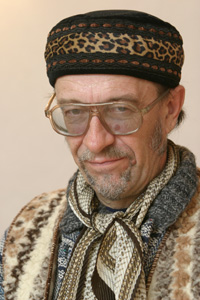
Juris Ābols
(16.04.1950 - 31.10.2020 )
"The life of a person is involved with perpetual cognition. That materialisation does not allow me to repeat myself in my music. Onward! Our era’s realities are quixotic, if I desire, I can join a large mob carrying weapons; there is not much difference between a Dadaist and a journalist – or, how many of the greats thought – Dada is all. All is dada. Still, only faith can separate the adequateness of the reflection of reality. It is good, if it is larger than a mustard seed, since today any text does not make much sense – mankind, which, from its own experience, has not learned anything in ten thousand years – in reality, is tormented by the same two questions, as in the Palaeolithic Era: What to do? And: Who is at fault?... That is why I do not try to complicate or beautify my aesthetic problems – if only for necessity’s sake – but I still do place a great awareness on the quality of information. My consciousness tells me everything that I need to know directly and – aesthetic daring – getting to know those actual facts, which are ridiculed by people... To review a person’s cultural-historical experience is difficult. But it is beautiful... I do not crave beauty – that is why I do not compose very much."
Juris Ābols
The composer Juris Ābols was born on April 16th, 1950, in Riga, to the family of painter Ojārs Ābols and linguist Mirdza Ābola. He completed the Latvian State Conservatory (now the Academy of Music) in the flute class of Jānis Morics, receiving his diploma in teaching and concert performance (1972) and the composition class of Ādolfs Skulte (1982); after that he worked as a free-lance artist. He performed in the Latvian National Opera Orchestra (1976–1978). In the period of independence renewal, he worked in the field of journalism, and he performed in a piano trio together with composer Edmunds Goldšteins and violinist Jānis Bulavs, performing classical, the music of Latvian composers, as well as his own music. In 1988/1989, he recorded and produced the record Smilšu laiks (Time of Sand) as a testament to this collaboration. From 1998 until 2005, he worked as an organist in Strasbourg, France, involving himself in the sphere of Catholic Church music. As of 1987, he was a member of the Latvian Composers’ Union.
From his father he inherited a philosophical world view, which is centred in humanism and the observation of the world’s social process - the complicated interconnections, contexts and cross-cuts. Beginning already with his first approbated works (Piecas latviešu dejas [Five Latvian Dances], Prelude and Toccata) the thematic centre is – thoughts of people, their inner world, reaching into the deepest depths of consciousness, to which are dedicated a considerable, psychedelically centred plethora of compositions since the beginning of the 80s. Here he has learned from Luciano Berio and Mauricio Kagel, but still holding on to his own individual style – experimenting with the human voice in many difference emotional situations, using ancient deceased languages (Carmina byzantica, Normālā fizioloģija [Normal Physiology] and others), exploiting a whole five languages in one opus (Mūsu cilvēks Beiczinā (L’amiral cherche une maison a louer) [Our Man in Beijing]. Altogether, language is used on all levels – beginning with intonemes materializing in the consciousness until their electronic transformation, from the ancient Greek, Thracian, Assyrian language, to the so-called imaginary languages, in the Dadaist lexicon, and finally – his birth language with its dialects.
Cultural history, ancient culture and civilization expert: occasionally in his works we see some cultural reference. He does not flee from the most traditional means of music expression, for example, the classical harmony school. He was interested in national cultures, the historical and geographical parallels. In his free time – ethnic genesis and ancient cultures, which research resulted in the assembling of the Baltobalkānistikas Enciklopēdijas [Balto-Balkan Encyclopedia] (2002) and separate research manuscripts. He researched regularly.
Overall, he is a bitonalist and polytonalist. Polystylist. At the end of the 90s, Dadaist opuses competed with works composed in a traditional style; in 2004, to this symbiosis electronica and folk-rock was added (Jautra sabiedrība [Joyous Society]). The motifs are not particularly ironic; jeering, sarcasm, absurd humour, especially at the time of the turn of the century. Still, in this irony there is no evil; if ethics prevails over aesthetics – then that is a cultural-history experience of humanity or cultural process reward. The sounds of his opuses can be tinted with a resigned, sad smile, along with that, those enjoying his musical process are given the question: But why?...
J. Ābols’ publications on cultural problems are also found in the Latvian press and concert reviews. His recordings – in the Latvian Radio sound recording library, the Latvian National Library Music Division; manuscripts – the Latvian National Library Music Division, the Latvian Academy of Music sheet music library. Photo materials – in the personal archives of composer Edmunds Goldšteins.
Juris Ābols, Mārīte Dombrovska Photo - Edmunds Mickus © LMIC
